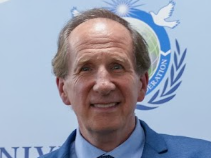Melbourne Meeting: One Human Family through Shared Values
- khwang562
- May 31, 2025
- 5 min read
Updated: Sep 8, 2025
Melbourne, Australia – To commemorate the UN International Day of Families, UPF-Australia and the Women’s Federation for World Peace (WFWP) Australia hosted a conference on May 31, 2025, with the focus on “One Human Family – The Role of the Abrahamic Faiths in Fostering Shared Values for Peace Building.”
The 2025 UN Day theme is “Family-Oriented Policies for Sustainable Development.” To foster sustainable development, peace is essential, since conflict has the greatest negative impact on families. The 40 attendees included religious, community, business and political leaders, who discussed how the Abrahamic faiths – Judaism, Christianity and Islam – all advocate values that promote peace.
Mr. Milon Islam, vice president of the Islamic Council of Victoria said, “This conference was a heartfelt gathering of souls committed to peace, unity, and a shared humanity. The seminar brought people together across cultures and faiths to reflect deeply on what unites us.”
MC for the program was Ms. Preetah Bolaky, founder of Preetah Bolaky Coaching and representative for Oceania of WFWP’s UN Office. Mr. Hussen Mahamed, head of the Australian Multicultural Media Centre, filmed the event.
Prof. Anoop Swarup, chairman of the Centre for Global Nonkilling and secretary general of the Association of Universities of Asia and the Pacific, warned that without a rise in ethical awareness, humanity could undermine the very foundations of civilization. His center advocates for peace based on four truths: our inherent human leaning towards nonviolence; our spiritual and scientific traditions’ respect for life; the fact that nonkilling can be systematically developed; and the ability of nonviolent movements to fight injustice effectively.
Ms. Bismi Palatty, a dynamic speaker, emerging author, inspiring radio host, and impactful speaking coach, explained that as a Christian, she guides others to align with their core values. She maintained that the Abrahamic faiths share the core values of obedience, perseverance and generosity, which align with love, peace and joy. She also said that the “golden rule” is found in the religious texts of all three faiths.
Fr. Jacob Joseph is the deputy president of the Victorian Council of Churches and a lecturer in patristic theology, liturgy, history and mission at St. Athanasius College, University of Divinity, Melbourne. He argued that the Abrahamic faiths provide an understanding of the “God perspective,” but also the “human perspective” in the discussion of peace and coexistence. In these faith traditions, the creation of human beings imbues them with free will and purpose, which are vital for peace building. He said that free will aims to reflect humans’ spiritual image of God. Unlike a materialistic and deterministic perspective, this enables individuals to live in a society where love, peace and justice are exercised in abundance.
Dr. John Bellavance, vice president of UPF-Australia and Oceania coordinator for the International Association of Academicians for Peace, outlined the shared values and principles of the Abrahamic Faiths. He argued that these faiths share foundational values that emphasize peace within oneself, within the family and with the environment. These universal principles offer a powerful framework for promoting social wellbeing, justice, human rights, and the dignity of all people. He said that, in a time marked by division and an “us versus them” mentality in religion, politics, and culture, a renewed commitment to our common humanity is necessary.
Dr. Bellavance gave a report on UPF’s Middle East Peace Initiative, showing that UPF’s approach to peace building worked to create strong bounds between political and religious leaders of the Abrahamic faiths in the Middle East.
Mr. Yousef Alreemawi is a writer, internationally renowned proofreader of Arabic content, founder of the Palestine Remembered radio program, and expert on Arab culture and Palestine. He said that Australia is lucky to have embraced multiculturalism for 50 years, but that different communities need to talk more to each other. His vehicles for this are art, music and culture. His goal is to promote Arabic culture, the primary culture in 22 countries. A refugee from Gaza who attended one of his concerts told him, “For me, the war in Gaza has stopped for two hours during this concert.” Mr. Alreemawi maintains that in dark times we need art to rethink our reality. Quoting Novalis, the German poet, he said, “Poetry heals the wounds inflicted by reason.”
Mr. Milon Islam spoke on the topic of one human family, beginning with a quote from the Quran: “Indeed, the most noble of you in the sight of Allah (SWT) is the most righteous of you.” This reminds us that our worth is not determined by our faith alone, he said, but by our actions and our commitment to justice and compassion. He added, “The relationships between our faiths have been complex, marked by both conflicts and cooperation. While history has seen moments of division, it has also witnessed remarkable instances of collaboration, such as The Golden Age of Spain, a period where Jews, Christians, and Muslims coexisted and thrived together, contributing to advancements in science, philosophy, and the arts.”
He said that misconceptions about other’s beliefs can lead to hostility and violence, so it is essential to foster dialogue and education to dispel myths and build trust. Religion can be misused to justify conflict, so there is a need for authentic, faithful interpretation and dialogue. The Abrahamic faiths, with their rich traditions and shared values, can play a vital role in fostering peace and understanding. He said these should not only be taught in schools, religious communities, and homes, but practiced in relationships, politics and media.
Venerable Bhikkhuni Bodhicitta is a Sri Lankan Theravada Buddhist nun based in Melbourne with over 25 years’ experience in meditation. She spoke about Buddhism as a religion of peace towards all life, stemming from core concepts like non-violence, compassion, and the understanding of interconnectedness. She described the Karaniya Metta Sutta (The Buddha's Words on Loving-kindness), a famous scripture that describes radiating kindness outwards to the entire world, without exception.
Ms. Sara Cohen, who participated in the Middle East Peace Initiative (MEPI) in Israel in 2015, shared her refection in text form, as she could not attend in person. As the former convenor for the Australian Psychological Society’s Psychologists for Peace, she reflected on the subject of peace psychology.
“MEPI was an opportunity to connect with people who share a vision for humanity that calls upon each of us to live to our greatest potential in peace. Religion and spirituality can offer us pathways to connect with and honor others in our shared humanity. Bringing people together in such forums is vital for enabling this,” she said.
Following the speeches, Bishop Nelson Pervaz, Victorian coordinator of the Interreligious Association for Peace and Development, joined Dr. John Bellavance in presenting the Ambassador for Peace Award to Mr. Milon Islam and Mr. Yousef Alreemawi. Mr. Philip Sacca, former president of the Beit Jala Palestinian Association in Victoria, joined Dr. Bellavance in presenting the award to his association’s current president, Ms. Mary Zeit Musleh.
The program concluded with a Call to Action that included the following:
1. Strengthening interfaith networks is vital for peace locally, in the Middle East and the world. Continued dialogue is needed to articulate a vision for "one human family living in peace.” It is through these shared values that we can begin to build bridges of understanding and peace.
2. When fostering harmony, we need to find issues of agreement among diverse cultures and faiths. Cooperation between Jews, Christians and Muslim is vital to build peace in Palestine and the Middle East.
3. We cannot wait for governments alone to solve our problems. Peace begins with us, it begins when we choose understanding over judgment, kindness over cruelty, and dialogue over division.






























